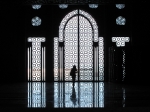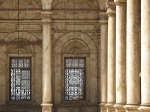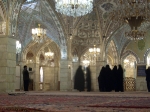 There is always water. Mosques of the old medinas go hand in hand with the hammam. Courtyards are adorned with fountains and in some, large ablution rooms lay deep within the mosque. It is social, it is for cleansing ones self.
There is always water. Mosques of the old medinas go hand in hand with the hammam. Courtyards are adorned with fountains and in some, large ablution rooms lay deep within the mosque. It is social, it is for cleansing ones self.
In Casablanca, the mosque is built over the sea. A bastion of faith on the old sea wall, the tides and waves curling into its foundation. Inside the fortress, a pocket of calm. From end to end a small channel carved into the marble floor, where water flows, cooling and soothing with its unique whisper.
 I stand barefoot on carpet, my sandals at the entrance with two men silently abuzz in arabic murmur. I am at ease in the peaceful inner décor of mosques. I am afloat and untouchable. There is a coolness to the marbled protectorate and a calming in the patterned mosaics. Calligraphic inscriptions of the Qur’an ring the columns and trace the contours of the sanctuary. I cannot read the arabic verses and so, uninterpreted, I am alone to inhabit my own story and welcomed to do so. I look inward, but feel expansive, heeding every breath.
I stand barefoot on carpet, my sandals at the entrance with two men silently abuzz in arabic murmur. I am at ease in the peaceful inner décor of mosques. I am afloat and untouchable. There is a coolness to the marbled protectorate and a calming in the patterned mosaics. Calligraphic inscriptions of the Qur’an ring the columns and trace the contours of the sanctuary. I cannot read the arabic verses and so, uninterpreted, I am alone to inhabit my own story and welcomed to do so. I look inward, but feel expansive, heeding every breath.
In Damascus busloads of Iranians descend the old city on this stop of their hajj. All in black, men in fine western suits and women draped head to toe. They are immaculately dressed, the women sharp in their embroidered burkas, fine slacks and leather shoes of the latest european fashion. Amongst themselves they hum with anticipation behind black sunglasses, but outwardly, they have all but removed themselves as anything more than a physical holder of the space they occupied. It is at once both eerie and oddly beautiful in its mystery and anonymity.
Darlene kneels on the soft divide between the muslim and christian halves of the mosque, a shrine for a prophet shared by both faiths. She is cloaked in a borrowed hood, yet her golden curls betray her. Families approach, smiling, and offer forth their children. Disinclined, but gracious, she accepts them and the families come to her and take photos, fathers and mothers with their children, collecting memories.
 Walter and I enter a neighboring mosque early one morning. There is only a hint of the surge of pilgrims that will later fill the streets and halls. It is a persian mosque with a martyr’s tomb. A slain child, daughter of a caliph, bloodline of the prophet. The tomb is adorned in gold beneath a dome of glass mosaic. Women in black huddle and cry softly. Families lean tightly together, reciting the qur’an amongst themselves. Tears of faith and belief for the little girl, as one by one, men and women enter the hall and press themselves against the tomb.
Walter and I enter a neighboring mosque early one morning. There is only a hint of the surge of pilgrims that will later fill the streets and halls. It is a persian mosque with a martyr’s tomb. A slain child, daughter of a caliph, bloodline of the prophet. The tomb is adorned in gold beneath a dome of glass mosaic. Women in black huddle and cry softly. Families lean tightly together, reciting the qur’an amongst themselves. Tears of faith and belief for the little girl, as one by one, men and women enter the hall and press themselves against the tomb.
We are on the floor by the marble columns of the entrance when an elderly gentlemen steps forward. After a moment, he turns and comes to us. I look up into his eyes. “I am Iranian,” he says and extends a welcome. In turn he shakes our hands, touches his heart, then turns and walks to the tomb, where he presses his head against its side and closes his eyes.
In occupied Palestine, we cross the square and stand at the open door of the mosque named for the second Caliph. Atop a flight of stairs a small, venerable gentlemen in a conservative, gray western suit and stocking feet, waves us up. He is the muezzin, the man who sings the call to prayer, and he invites us to join him.
The prayer hall is a large, humble space on the second floor where we are joined by several men who joke about the merits of sons and daughters and share with us the extent of their own families. When the time comes, we are invited downstairs into his station, a simple room with a microphone and stereo system wired to the minarets loud speakers. With us seated beside him, he smiles, stands, and turning to the microphone, he sings.
The adhān covers the entirety of Arabia. By design, this call to prayer penetrates every nook of the city. It is intentionally loud and often tinny. However, on that afternoon in Palestine, when the muezzin sang, we heard that call in its purest form. We shared the intimacy of his song, his heart, and his pride. The complicity of organized society confounds me the world over, but the gifts of an individual does not.
[smooth=id:35]



 Follow
Follow
July 7th, 2010 by becca
WoW! Holy beautiful pictures! They are breathtaking!!!!!!
July 7th, 2010 by Dianne / Mom
From the description and pictures I feel like I shared that experience with you ! I am an armchair traveller. Love you !
July 7th, 2010 by Ken Ying
Beautifully written! Brings back so many memories, especially when I was floating down the Nile on a felucca. All of a sudden, all of the mosques around rang out at once, and being a distance from the loud speakers, it sounded like a chorus, poetic, even calming. Hope your travels are going great! I unfortunately am home, and catching up with everyone else’s blogs!